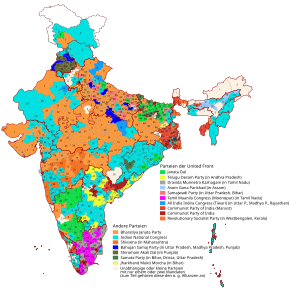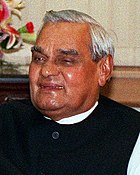1996 general election
|
|
|||||||||||||||||||||||||||||||||||||||||
|---|---|---|---|---|---|---|---|---|---|---|---|---|---|---|---|---|---|---|---|---|---|---|---|---|---|---|---|---|---|---|---|---|---|---|---|---|---|---|---|---|---|
|
|||||||||||||||||||||||||||||||||||||||||
|
All 545 seats in the Lok Sabha 273 seats were needed for a majority |
|||||||||||||||||||||||||||||||||||||||||
|
|||||||||||||||||||||||||||||||||||||||||

|
|||||||||||||||||||||||||||||||||||||||||
|
|||||||||||||||||||||||||||||||||||||||||
Atal Bihari Vajpayee (BJP)
H. D. Deve Gowda
UF
General elections were held in India in 1996 to elect the members of the 11th Lok Sabha contested by the Congress Party and Bharatiya Janata Party. The result of the election was a hung parliament with neither top two leading securing a mandate. The Bharatiya Janata Party formed a short lived government. United Front, consisting of non Congress, non BJP was created and secured support from 332 members out of the 545 seats in the Lok Sabha, resulting in H.D. Deve Gowda from the Janata Dal being the 11th Prime Minister of India. The 11th Lok Sabha produced three Prime Ministers in two years and forced the country back to the polls in 1998.
The Indian National Congress government of Prime Minister P. V. Narasimha Rao came into the election on the back of several government scandals and accusations of mishandling. Seven cabinet members had resigned during the previous term, and Rao himself faced charges of corruption. The Congress Party more generally had been plagued in recent years by a series of splits, issues conflicts and factional disputes that had seen various key regional parties and figures abandon the party. In particular, the high profile May 1995 defection of Arjun Singh and Narayan Dutt Tiwari to form the new All India Indira Congress (Tiwari) party underscored the internal divisions within the INC.
...
Wikipedia




